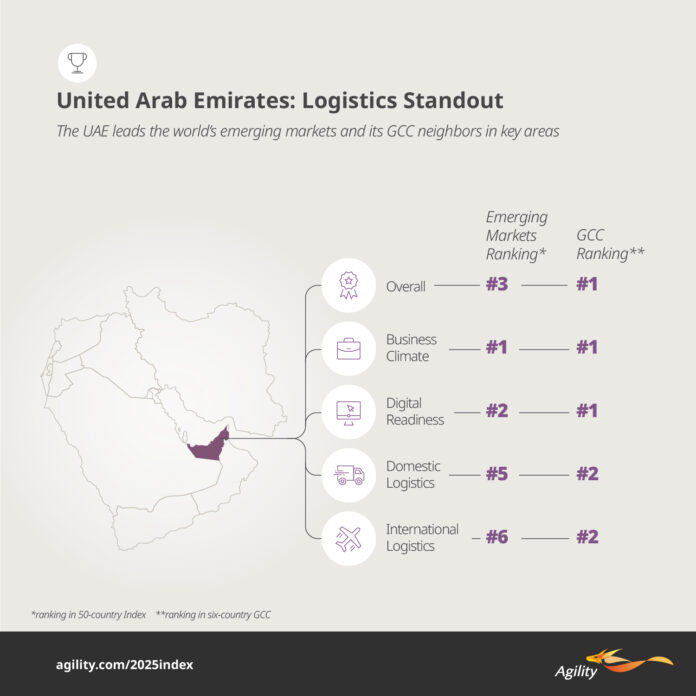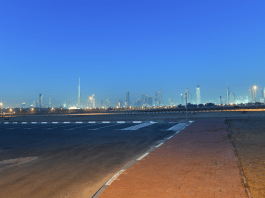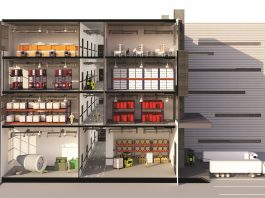
Across the board, the Emirates ranks among leaders in key logistics-related categories
The United Arab Emirates offers the best environment for business and outperforms virtually all other emerging economies when it comes to logistics opportunities and digital readiness, according to the 2025 Agility Emerging Markets Logistics Index.
The 50-country Index, now in its 16th year, shows the UAE improving its overall competitiveness based on domestic and international logistics strengths, business climate and digital readiness – factors important to logistics providers, freight forwarders, air and ocean carriers, distributors and investors. The UAE finished among the top six in all four Index categories.
The 2025 Index lauds the Emirates for expanding the scope of public-private partnerships, acting with urgency to meet the climate challenge, clustering logistics and industrial activities, improving customs performance and air/ocean connectivity, reducing CO2 emissions, and supporting startups and digital skills development.
The Emirates is No. 3 overall behind only China and India, which hold a significant advantage over other markets in the 50-country rankings because of their size. “The UAE is continuing to close the gap with other countries above it in the rankings, demonstrating the benefits of its investment strategies,” the Index says.
In addition to the rankings, the Index features a survey of 567 logistics industry professionals.
More than 62% of those surveyed say they’ve overhauled their supply chains to safeguard against inflation, looming trade tariffs, the possibility of a global economic downturn and other major risks.
The survey shows the logistics industry entering 2025 looking to protect itself from rising costs and a potential trade war ignited by expected U.S. tariff hikes and a flood of exports from China.
“There is wariness and uncertainty among shippers, carriers, forwarders and others when it comes to the geopolitical factors that drive up costs, affect trade volumes, and alter supply chains,” says Agility Vice Chairman Tarek Sultan. “Companies doing business internationally continue to shift production as they re-evaluate investment plans and search for durable paths to growth.”
The 2025 Index features an in-depth analysis of UAE and its Arabian Gulf neighbors. Individually and as a group, the six Gulf countries are positioning themselves as global trade hubs, investing heavily in infrastructure, AI, energy transition, and workforce development. Despite increasing risk to global supply chains, the UAE, Saudi Arabia and other Gulf countries have become “beacons of stability” and resilience, the Index concludes.
Stability at the top of the 50-country rankings was accompanied by volatility and movement further down in the Index. China, India, UAE, Saudi Arabia, Malaysia, Indonesia, Mexico, Qatar, Thailand and Vietnam rank 1 through 10. Colombia (No. 21) leaped up the rankings; as Nigeria (43), Bangladesh (39) and Ukraine (40) tumbled.
The six Gulf countries all are among the top 11 for business conditions: UAE again tops the rankings for best business climate; Saudi Arabia is 3rd; Qatar 5th. The countries most digitally ready are China, UAE, Malaysia, Qatar and Saudi Arabia.
In international logistics opportunities, China, India, Mexico, Indonesia and Saudi Arabia rank highest. In domestic logistics, the leaders are China, India, Indonesia, Saudi Arabia and UAE.
SURVEY
- Recession — Nearly 55% of respondents see a global recession as likely or certain.
- Protectionism — Almost 82% say tariffs and other trade protectionism are having a significant impact on their supply chains.
- Emerging markets – 72% say risks in emerging markets have increased over the past year.
- China – 54% intend to move production or sourcing out of China in the next five years with U.S.-China trade friction, labor costs and increasing domestic regulation being the biggest factors.
- Africa – Despite seeing heightened risks in emerging markets, 35% plan to boost investment in Africa in 2025 vs. only 8% planning to cut back there.
- Net-Zero – Nearly 65% say their companies are on track to meet net-zero goals.
COUNTRY RANKINGS
- In the Middle East and North Africa, overall rankings are: UAE (3); Saudi Arabia (4); Qatar (8); Turkey (11); Oman (14); Bahrain (16); Jordan (17); Kuwait (18); Egypt (24); Morocco (26); Iran (32); Tunisia (36); Algeria (38); Lebanon (42); Libya (46).
- Rankings in Sub-Saharan Africa: South Africa (20); Kenya (22); Ghana (31); Tanzania (37); Uganda (41); Nigeria (43); Ethiopia (45); Angola (47); Mozambique (48).
- Rankings in Asia: China (1); India (2); Malaysia (5); Indonesia (6); Thailand (9); Vietnam (10); Philippines (23); Kazakhstan (25); Sri Lanka (27); Cambodia (30); Pakistan (33); Bangladesh (39); Myanmar (49).
- Rankings for Latin America: Mexico (7); Chile (11); Brazil (13); Uruguay (19); Colombia (21); Peru (28); Argentina (29); Ecuador (34); Paraguay (35); Bolivia (44); Venezuela (50).
- In Europe: Ukraine (40).
Transport Intelligence (Ti), a leading analysis and research firm for the logistics industry, has compiled the Index since it was launched in 2009.
John Manners-Bell, Chief Executive of Ti, said: “Despite global economic headwinds and disruption to shipping lanes over the last year, the Gulf economies have proved exceptionally resilient. Diversification and their focus on investment in transport, the green energy transition, and other major infrastructure projects has laid the foundations for future growth. The improving security situation across the region will only act to accelerate their development as a bridge between emerging superpowers and the West.”












